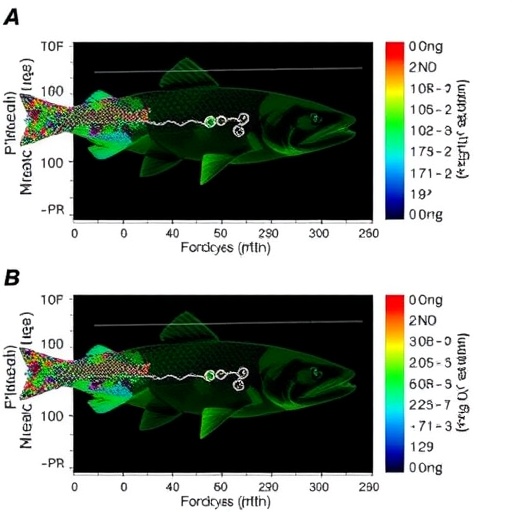In a groundbreaking study published in the renowned journal BMC Genomics, researchers Li, Shi, Sun, and their team shed light on an intriguing phenomenon in the world of aquaculture: the selective lipid deposition in muscle fibers and myosepta of triploid rainbow trout. This study presents a comprehensive analysis, employing advanced molecular techniques to unravel the complex interactions at play in lipid metabolism within the musculature of these genetically modified fish.
Triploid rainbow trout, characterized by their three sets of chromosomes, have garnered attention for their potential advantages in aquaculture, including faster growth rates and improved feed conversion efficiency. However, their peculiar metabolic processes raise important questions regarding the biochemical pathways that govern lipid accumulation in muscle tissues. The authors of this study have delved deep into these metabolic pathways, employing long non-coding RNAs (lncRNAs) in conjunction with messenger RNAs (mRNAs) to elucidate the regulatory networks instrumental in the observed lipid deposition patterns.
Utilizing RNA sequencing technologies, the team analyzed the expression profiles of various lncRNAs and mRNAs in triploid rainbow trout. Their research unveiled an intricate interplay between these non-coding and coding RNAs, suggesting that lncRNAs play a critical role in regulating the genes involved in lipid metabolism. This finding challenges the traditional view that coding RNAs are the sole players in genetic regulation, illuminating the importance of non-coding RNAs in the metabolic processes of organisms.
The study further highlights the significance of understanding lipid metabolism in triploid rainbow trout, particularly given their prominence in the global aquaculture industry. With an ever-growing demand for sustainable fish farming practices, insights gained from this research could potentially lead to the development of improved breeding and feeding strategies, thereby optimizing lipid profiles for enhanced growth and overall health in these fish species.
Moreover, the researchers engaged in a comparative analysis between diploid and triploid rainbow trout, elucidating fundamental differences in lipid accumulation. This comparative approach not only sheds light on triploid-specific mechanisms but also contributes to a broader understanding of how genetic variations influence metabolic pathways in aquatic species. Such insights are invaluable for developing targeted interventions within aquaculture, ensuring the health and productivity of cultivated fish populations.
Importantly, the authors also explored the environmental factors influencing lipid deposition patterns in triploid rainbow trout. Factors such as temperature, salinity, and diet were shown to significantly affect the expression levels of the identified lncRNAs and mRNAs. This highlights the necessity for aquaculture practices to adapt to the multifaceted interactions between genetics and environmental conditions, optimizing lipid deposition in a manner conducive to sustainable growth.
The implications of these findings extend beyond mere academic interest. Enhanced knowledge of lipid metabolism in triploid rainbow trout holds significant promise for addressing the nutritional needs of consumers while minimizing the environmental impact of aquaculture practices. With growing awareness surrounding the sustainability of food sources, fostering healthier lipid profiles in farmed fish can contribute to better nutritional outcomes for consumers.
The study’s findings are particularly relevant considering the increasing prevalence of triploid fish in aquaculture. As fish farming practices evolve, ensuring optimal growth rates while maintaining the nutritional quality of the product is paramount. By unraveling the molecular underpinnings of lipid deposition, the authors advocate for a reevaluation of current aquaculture practices in light of genetic advancements, paving the way for future innovations in the industry.
In conclusion, the research conducted by Li, Shi, Sun, and their colleagues represents a significant contribution to our understanding of lipid metabolism in triploid rainbow trout. By revealing the intricate interplay between lncRNAs and mRNAs, the study underscores the importance of genetic and environmental factors in shaping metabolic pathways. These insights are not only critical for advancing aquaculture practices but also have broader implications for fish health, sustainability, and food security in an ever-evolving global landscape.
As demand for sustainable aquaculture continues to rise, investigations such as this pave the way for revolutionary practices that could transform fish farming, ensuring that nutritional needs are met while cultivating environmentally responsible techniques. The study encourages ongoing research into the genetic mechanisms behind lipid metabolism, promising to shed further light on the complexities of aquatic organisms and their cultivation.
This research heralds a new era in aquaculture, where understanding the molecular mechanisms at play can lead to innovative practices and sustainable outcomes. The insights generated from this study will undoubtedly resonate throughout the aquaculture community, inspiring future work to tap into the genetic potential of various fish species for culinary excellence and responsible farming.
In summary, the work is a call to action to embrace genetic research in aquaculture, focusing not only on productivity but also on the quality and sustainability of fish farming practices. The potential applications of these findings pave the way for a more responsible aquaculture sector, with the promise of better health outcomes for both fish and humans alike.
Subject of Research: Lipid deposition in muscle fibers and myosepta of triploid rainbow trout
Article Title: Why the lipid deposition in the muscle fibers and myosepta is selective in triploid rainbow trout? A lncRNA‒mRNA study.
Article References:
Li, Q., Shi, F., Sun, G. et al. Why the lipid deposition in the muscle fibers and myosepta is selective in triploid rainbow trout? A lncRNA‒mRNA study.
BMC Genomics 26, 1001 (2025). https://doi.org/10.1186/s12864-025-12208-2
Image Credits: AI Generated
DOI: https://doi.org/10.1186/s12864-025-12208-2
Keywords: Lipid metabolism, triploid rainbow trout, lncRNA, mRNA, aquaculture, fish farming, sustainability, genetic research, nutrition.




